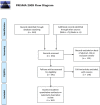The Impact of Climate Change on Mental Health: A Systematic Descriptive Review
- PMID: 32210846
- PMCID: PMC7068211
- DOI: 10.3389/fpsyt.2020.00074
The Impact of Climate Change on Mental Health: A Systematic Descriptive Review
Abstract
Background: Climate change is one of the great challenges of our time. The consequences of climate change on exposed biological subjects, as well as on vulnerable societies, are a concern for the entire scientific community. Rising temperatures, heat waves, floods, tornadoes, hurricanes, droughts, fires, loss of forest, and glaciers, along with disappearance of rivers and desertification, can directly and indirectly cause human pathologies that are physical and mental. However, there is a clear lack in psychiatric studies on mental disorders linked to climate change.
Methods: Literature available on PubMed, EMBASE, and Cochrane library until end of June 2019 were reviewed. The total number of articles and association reports was 445. From these, 163 were selected. We looked for the association between classical psychiatric disorders such as anxiety schizophrenia, mood disorder and depression, suicide, aggressive behaviors, despair for the loss of usual landscape, and phenomena related to climate change and extreme weather. Review of literature was then divided into specific areas: the course of change in mental health, temperature, water, air pollution, drought, as well as the exposure of certain groups and critical psychological adaptations.
Results: Climate change has an impact on a large part of the population, in different geographical areas and with different types of threats to public health. However, the delay in studies on climate change and mental health consequences is an important aspect. Lack of literature is perhaps due to the complexity and novelty of this issue. It has been shown that climate change acts on mental health with different timing. The phenomenology of the effects of climate change differs greatly-some mental disorders are common and others more specific in relation to atypical climatic conditions. Moreover, climate change also affects different population groups who are directly exposed and more vulnerable in their geographical conditions, as well as a lack of access to resources, information, and protection. Perhaps it is also worth underlining that in some papers the connection between climatic events and mental disorders was described through the introduction of new terms, coined only recently: ecoanxiety, ecoguilt, ecopsychology, ecological grief, solastalgia, biospheric concern, etc.
Conclusions: The effects of climate change can be direct or indirect, short-term or long-term. Acute events can act through mechanisms similar to that of traumatic stress, leading to well-understood psychopathological patterns. In addition, the consequences of exposure to extreme or prolonged weather-related events can also be delayed, encompassing disorders such as posttraumatic stress, or even transmitted to later generations.
Keywords: climate change; climatic and economic turmoil; extreme events; mental health; migration; resilience; vulnerability.
Copyright © 2020 Cianconi, Betrò and Janiri.
References
-
- Cianconi P, Tarricone I, Ventriglio A, De Rosa C, Fiorillo A, Saito T, et al. Psychopathology in postmodern societies. J Psychopathol (2015) 21:431–9.
-
- Church JA, Clark PU, Cazenave A, Gregory JM, Jevrejeva S, Levermann A, et al. 2013: Sea Level Change. In: Climate Change 2013: The Physical Science Basis. Contribution of Working Group I to the Fifth Assessment Report of the Intergovernmental Panel on Climate Change. Cambridge, United Kingdom and New York, NY, USA: Cambridge University Press; (2013).
-
- NASA Global climate change Severe thunderstorms and climate change. . [Online] April 7, 2013. [Cited: May 26, 2019.] https://climate.nasa.gov/news/897/severe-thunderstorms-and-climate-change/.
-
- Seneviratne SI, Nicholls N, Easterling D, Goodess CM, Kanae S, Kossin J, et al. Changes in climate extremes and their impacts on the natural physical environment. Cambridge, UK, and New York, NY, USA: Cambridge University Press; (2012). A Special Report of Working Groups I and II of the IPCC.
Publication types
LinkOut - more resources
Full Text Sources


